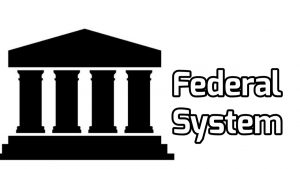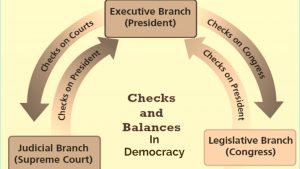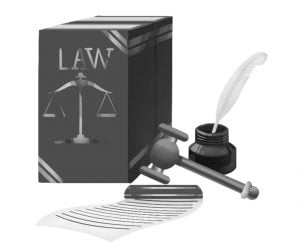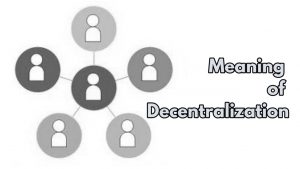Meaning and Features Of Federalism: Federalism is a compound form of government where the Government ruling over the people in a country exist in several levels or tiers i.e the federal or chief government, and then regional or state or provincial governments. Some federal States also have another tier called the local or grassroot government.
Each of these levels of government is a unit in its own right, and they exist in parity alongside each other.
Federalism should never be mistaken with confederacy or a confederation, because the levels of government in the latter do not exist in parity. The central government rather draws its powers from the unit or regional government.
Examples of countries that practice federalism include; Nigeria, Russia, India, Canada, Malaysia, Germany, Belgium, Pakistan, etc.

Recommended: Advantages and Disadvantages of a written constitution
Characteristics/Features of Federalism
The features of Federalism cuts across several key areas or factors of governance. They include;
1. Power Distribution: In a country practicing Federalism, powers are usually distributed among the federal government and regional or state governments. In some countries such as Nigeria, powers and governmental duties are grouped into three different lists – the Exclusive, the Concurrent and the Residual list. These lists clearly defines the scope and powers and limitations of each level of government.

Powers are also shared amongst the arms of government namely; the Executive, the Legislature and the Judiciary. Each has their own specific functions and isn’t constitutionally permitted to encroach into the grounds of the other. They are however empowered by law to carry out checks and balances on each other to prevent or stall governmental excesses.
2. Independent Judiciary: In a federal system of government, the Judiciary must be able to take independent decisions. Their judgements and interpretation of the law should not be influenced by any of the other arms of government.

The main function of the Judiciary is to deliberate over legal issues and questions, and to do so according to the constitution and applicable laws. The true spirit of Federalism can only be retained when the Judiciary is left to independently discharge its duties.
The Judiciary is also expected to step in as peacemaker when there are conflicts between the other two arms of government. I is within the Judiciary’s scope of duties for resolve the issue(s), and bring these arms of government to an agreement.
3. Constitution: The constitution used in any State practicing Federalism has distinct characteristics. Firstly, the constitution has to be written, and on the other hand, it also has to be rigits, as opposed to being flexible. This means thats laws contained the constitution, and indeed the constitution as a whole cannot be amended easily. It has to go through a process of laid-down methods that specifically provides for constitutional amendment. In addition, the constitution can only be amended through this process only if the levels of government first agree. If they don’t agree, or one of them doesn’t, the constitutional amendment cannot take place.

On the former, a constitution is a written one when the supreme laws of the land are contained in one document. Also, the powers of each arm or level of government is clearly defined by it.
Federalism also entails that the constitution should be the highest law of the land, and would be over and above all of the people of that state; both the governed and those governing. As a matter of fact, the constitution creates the office which those who govern the people occupy, as well as defining their powers and limitations. The constitution in this case stipulates or dictates the powers to be held by government and how they are to be distributed.
Federalism is an expression of the sovereignty and supremacy of the constitution.
4. Legislature: The legislative arm in a country practicing Federalism is usually bicameral in nature. This means that such country should have two legislative houses; often the upper and lower house. Some scholars are of the opinion that bicameralism is practiced in federalist states because the two houses would complement each other and also carry out checks and balances on each other in an effort at accountability.

Another group of scholars are of the opinion that the higher house represents the interests of the governing body, while the lower house, usually composed of more members than the higher house, represents the interest of the State or the people.
5. Decentralization: This entails a lot of things, including the arms of government delegating some of their powers and duties to individual and smaller bodies to carry out on their behalf. This practice leads to the diffusion of powers into handleable chunks, and when delegated to the appropriate subordinates, it often makes for efficiency in the business of governance.

However, the major meaning of decentralization in a federalist sense is that all powers are not concentrated in one arm or level of government. Powers are shared amongst them instead.
Recommended: Countries With The Lowest/Least Population In The World
6. Sovereignty: The central government and component entities have some sovereignty and power. State sovereignty is the absolute power over its people and territory. States or provinces share sovereignty with the central government under a federal system like the US or India. This arrangement gives the central government and component entities some sovereignty and authority.

The central government handles foreign policy, national security, and interstate trade. Education, health care, and law enforcement are handled by constituent units. The central government’s sovereignty and authority depend on the country’s constitution.
Also see: Countries with the highest number of prostitutes
7. Dual Governance: The federal government and constituent entities both have authorities and duties. The central or federal government and component divisions, such as states or provinces, make up a federal system, such as in the US or India. The “dual government” arrangement provides two levels of authority and power. The central government handles national defence, foreign policy, and interstate trade.

It is also responsible for formulating and implementing laws that apply to the entire country, such as immigration and criminal law. Education, public health, and local law enforcement are handled by constituent units. Subject to central government restrictions, they can make and enforce local laws. This dual government system distributes authority between the central government and component entities, preventing power centralization. It also enhances local autonomy and responsiveness.
Recommended: Advantages and Disadvantages of Alternative Dispute Resolution
8. Revenue: Each tier of government should have their own source of revenue, and never totally depend on the other for funds in a state of true Federalism.

For more features of federalism, i enjoin you to watch the YouTube video below. Trust me, you won’t regret it at all.
Pros and Cons of Practicing Federalism
The merits and demerits of Federalism are as follows;
Merits:
First, the government is brought closer to the people, by means of the formation of various levels of government. Each level has a group of people under it that it directly oversees. Those governing are accessible to the people and due to their proximity, understand the plight of the people better than officials from the Federal or Chief government.
Also, a federal state is a fertile ground for different forms of democracy. Democracy has been defined as an inclusive system of governance, and true Federalism also reflects that.
There’s also the reduced likelihood of fraud to occur among the government levels and arms, due to the system of accountability put in place. These arms of government perform checks and balances on themselves and query any questionable discoveries they make.
Recommended: Ways of promoting human rights and liberties
Demerits:
Due to the many departments in a federal system, existing as a result of the principle of decentralization, there’s often a delay in processes and red tapism is a common occurrence.
It is also hard to achieve uniformity of policies because all levels of government make decisions for themselves and these decisions often differ from each other.
In addition, it is expected that since states in a federalist country often make and implement different policies, it is likely that there’ll also be economic differences too. One cannot assuredly say that the whole country is this particular economic state or not.
Recommended: Best online universities in world
To maintain the spirit of Federalism in State, one factor is especially pertinent. All levels of government should equally have for themselves similar and a sort of replica of institutions working under it. For instance, as the federal government has its own legislative body, so should the state and local government. Electoral bodies, Revenue collection bodies, ministries and state departments should all be replicated in all levels of government in practice of decentralization for the purpose of efficiency.

Edeh Samuel Chukwuemeka, ACMC, is a lawyer and a certified mediator/conciliator in Nigeria. He is also a developer with knowledge in various programming languages. Samuel is determined to leverage his skills in technology, SEO, and legal practice to revolutionize the legal profession worldwide by creating web and mobile applications that simplify legal research. Sam is also passionate about educating and providing valuable information to people.